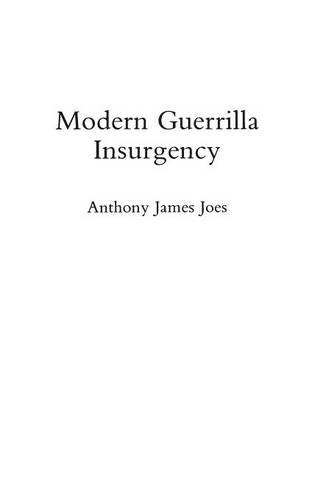
Modern Guerrilla Insurgency
(Hardback)
Publishing Details
Modern Guerrilla Insurgency
By (Author) Anthony J. Joes
Bloomsbury Publishing PLC
Praeger Publishers Inc
9th October 1992
United States
Classifications
Tertiary Education
Non Fiction
International relations
355.02
Physical Properties
Hardback
248
Description
This study argues that guerrilla insurgence will be a major feature of the post-Cold War international scene, and that the advisability of intervention in some of them will become a serious issue in American politics. Americans therefore need to refine their understanding of insurgency. Anthony James Joes analyzes several major insurgencies of this century, all of which the United States became involved in to one degree or another. While approaching each guerrilla insurgency as a primarily political phenomenon within a definite historical and cultural context, Joes also provides the reader with a clear understanding of the military aspects of such conflicts. The book deals with a variety of cases, some currently very controversial; provides jargon-free analysis of historical, political, and military factors; challenges some widely cherished views about the potency of third-world nationalism; emphasizes the flaws in both the French and the American strategies in Vietnam; and connects Soviet reverses in Afghanistan with the collapse of their empire in Europe. A major conclusion is that protracted guerrilla insurgency is usually the result of inept government policies; the author outlines a politico-military strategy for bringing an insurgency to an end. Another important conclusion is that our belief in the power of nationalism in insurgencies needs reevaluation. This volume should provide a new perspective for students, teachers, and general readers interested in international affairs, war, and foreign policy.
Reviews
"Professor Joes has completed an outstanding case study analysis of five post-WW II guerrilla insurgencies that had significant international political implications well beyond the actual theater of conflict. This thoroughly researched and well written volume should be of value to at least two audiences. For the scholar, the author presents a compelling analysis that outlines in detail the complex political sources of internal conflict and the degree to which insurgents skillfully and not so skillfully integrate these factors into a political-paramilitary strategy. This should likewise be most useful to the military officer at the Command and Staff and War College levels. The volume is equally important to the policymaker."-Richard H. Shultz Director, International Security Studies Program Tufts University
. . . Could not have come at a better time for academics, military strategists and policymakers who must rapidly learn how to not only react but also to take the initiative in a world where political instability and attendant armed conflict appear to be the rule and not the exception. Joes has written a fine historical comparative overview that is a welcome addition to the growing literature on low intensity conflict.-Terrorism and Political Violence
." . . Could not have come at a better time for academics, military strategists and policymakers who must rapidly learn how to not only react but also to take the initiative in a world where political instability and attendant armed conflict appear to be the rule and not the exception. Joes has written a fine historical comparative overview that is a welcome addition to the growing literature on low intensity conflict."-Terrorism and Political Violence
Author Bio
ANTHONY JAMES JOES is director of the international relations program at St. Joseph's University. He received his Ph.D. from the University of Pennsylvania in 1970. Among his previous writings are Fascism in the Contemporary World ssolini om the Barrel of a Gun: Armies and Revolutions, and The War for South Viet Nam (Praeger, 1989).
